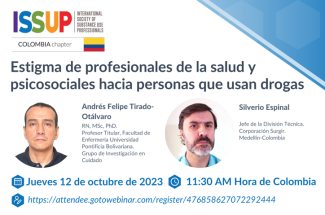Resulta fundamental entender que, para los casos de padecimientos mentales y también para los casos de consumo problemático, el estigma funciona como una barrera a la hora de acceder a los servicios de salud. Puede ser estigma internalizado: la persona se cree todas las características que la sociedad le asigna a personas con tal padecimiento o tal consumo. Como consecuencia de esto, no llega a los servicios sanitarios que pueden darle una solución a su problemática.
Otro tipo de estigma es el de contagio: por ser amigo, familiar de alguien que tiene tal o cual padecimiento, pasa a estar...
